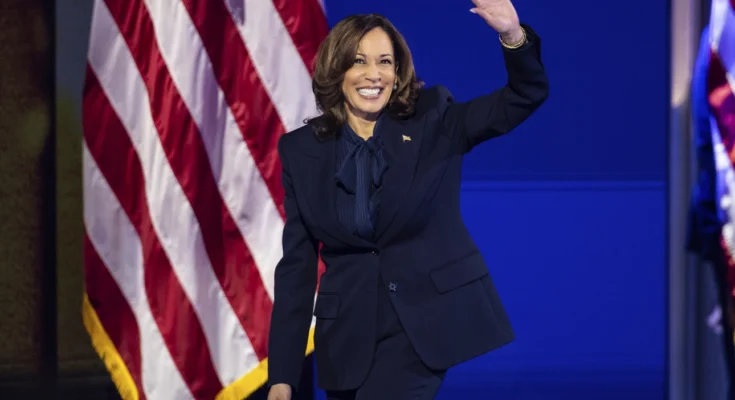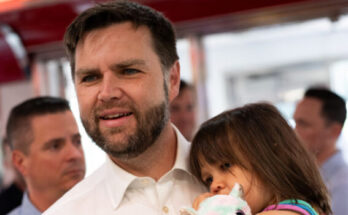CHICAGO — Democrats’ newfound energy and enthusiasm around Vice President Kamala Harris rose to a fever pitch here Thursday night, as she closed out a four-day convention with a forceful, optimistic vision of the future and the piped-in sounds of Beyoncé’s “Freedom.”
Now, the balloons having fallen from the rafters, comes the hard part — the final stretch of an unexpected campaign that will test Harris’ ability to keep the presidential contest on its current course.
After a boisterous four days in Chicago, the vice president faces a series of looming tests: her first sit-down media interview that she said would come by the end of the month, hundreds of millions of dollars worth of attack ads from her opponent and, perhaps most importantly, her Sept. 10 debate with former President Donald Trump.
For all the newfound enthusiasm around Harris, who has revived her party’s fading White House hopes, and all her strategists’ optimism about her campaign’s superior infrastructure and organization, Democrats recognize that the election remains far too close for comfort.
“I’ve been telling Democrats everywhere I go this week: Don’t get high on your own supply and think everyone is as energetic as you are,” said Rep. Elissa Slotkin, the Democrats’ Senate nominee in Michigan. “If you do, you obviously haven’t been to a swing state in awhile.”
It was a warning raised repeatedly by Democrats in the bubble of a party convention. For four straight days, a mix of the party’s biggest stars and advocates made the case for Harris from the convention stage. Women’s stories about their newly limited reproductive choices in red states brought delegates to tears. The Obamas, the Clintons, Minnesota Gov. Tim Walz and even the rapper Lil Jon sent the crowd into a frenzy. But it was a partisan crowd. And it’s unclear if anything that happened in Chicago will do more than deepen Democrats’ enthusiasm.
“Two things are going to happen: One, the honeymoon’s inevitably going to end, and two, the Republicans are going to figure out how to attack,” said Rep. Seth Moulton (D-Mass.) in an interview. “We have to be prepared for both of those eventualities. And that means we need to sharpen our attacks against them. We need to have real, solid policy proposals that lay out the Harris-Walz plan for America.”
A number of Democrats disagree that Harris needs to better define her policy positions, asserting that swing voters aren’t likely to make their decisions based on fully developed policy platforms. Unlike the crowded 2020 primary, where candidates, including Harris, looked to differentiate themselves based on policy pitches, the remaining 74 days of the campaign may hinge more on drawing sharp contrasts with Trump and giving voters information about a candidate most don’t know all that well — making them comfortable with the idea of her in the Oval Office.
But that itself is no small lift. The campaign’s broader message, its success or failure in defining Harris in positive terms and, above all, her performance on the stump and in the looming debate may determine the election’s outcome. Trump, running his third presidential campaign and reprising a political vaudeville act that no longer commands the nation’s attention the way it once did, is a known commodity. Harris is the one voters seem to be watching more closely.
If she performs well, Democrats are bullish about their ability to capitalize on an expansive campaign infrastructure and unbridled enthusiasm surrounding her candidacy that has made it seem to some like a movement. But if she stumbles, it will test the cohesion of a swelling campaign operation that is still in the process of integrating new advisers handpicked by Harris with a legacy operation originally structured around electing Biden.
Sen. Catherine Cortez Masto, a Harris confidant who served beside her in the Senate and when both served as state attorneys general, expressed confidence that the vice president would pass the coming tests just as she has exceeded expectations since taking over for Biden as the Democratic presidential nominee.
“I know she’s going to be well-prepared and she’s going to prosecute the case for working families, quite honestly, and take on Donald Trump and his lies,” Cortez Masto said in an interview at the United Center. “Vice president nominee Tim Walz has said it: ‘We’ll sleep when we’re done here.’ But it’s all on the table now. We’ve got to work hard. We’ve only got so many days left, and we’ve got to get out there and talk to our voters.”
Across private receptions, delegate breakfasts and impromptu interviews in the convention hall this week, several elected officials serving as surrogates for Harris cautioned party activists not to grow complacent in their renewed sense of optimism about Democrats’ electoral prospects.
Maura Healey, the governor of Massachusetts, channeled Walz in using sports metaphors to explain the stakes: “We have got to play like we’re 10 points behind, because while things have improved, we have a long way to go,” the former professional basketball player said at a reception she hosted Tuesday at Chicago Winery. “We know what the margins are. We know how small they are.”
At a New Jersey delegate breakfast on Thursday, Maryland Gov. Wes Moore stressed that activists can’t coast on their enthusiasm when “everybody gets on their planes” home — they have to put boots on the ground in must-win communities.

And Sen. Elizabeth Warren (D-Mass.) emphasized the importance of the ground game in an interview with POLITICO on Thursday after speaking at her home state’s delegate breakfast. “We can’t leave anything on the table,” Warren said. “We’ve actually got to produce here. And I think we have such a good case to make.”
Democratic leaders have grown particularly concerned with Trump’s favorability numbers, which ticked up following an assassination attempt and last month’s Republican convention. That’s despite Harris’ entrance into the race, a sustained Democratic effort to damage the former president from all angles — and Trump’s own increasingly erratic behavior. A Pew Research Center poll earlier in August found that 42 percent of adults have a favorable view of Trump, an improvement from three months ago that occurred even as Harris’ own favorables increased. That represents the highest favorability for Trump that Pew has recorded in at least two years.
The burst of energy surrounding Harris’ candidacy succeeded only in resetting the race to even, with Trump still leading or within the margin of error in many key swing states. And Democrats are still fighting uphill on issues like the economy, crime and immigration that voters consistently rank among their top concerns.
“We’ve seen a great four weeks,” Patrick Gaspard, head of the influential Democratic think tank Center for American Progress, said during a Thursday reporter roundtable hosted by Bloomberg News. “But it’s a dead even race, and a dead even race where Donald Trump’s supporters have consistently been undercounted in 2016 and 2020.”
Gaspard added: “I try to remind all my friends that Joe Biden had an eight-point lead going to Election Day in 2020, and he barely won. He won by the margin of your fingernails in Pennsylvania, Michigan, Wisconsin, Nevada, to get us over the top.”

Harris campaign chair Jen O’Malley Dillon acknowledged in an interview on Wednesday that the election “is a margin of error race.” On Thursday, the campaign’s director of battleground states, Dan Kanninen, said that the four days of euphoria inside the United Center weren’t taking place in a vacuum and pointed to 2,800 events across the key states this past weekend as an effort to make sure the heightened focus on the Democratic ticket and the party as a whole yields tangible dividends where it matters.
A shift competition across swing states on Monday yielded some 24,000 new volunteer shift sign-ups, Kanninen said. On Wednesday, the campaign’s 400 phone banks across the country marked the biggest such effort to date. And for Harris’ closing night speech on Thursday, the campaign organized 500 watch parties across the country.
“Since the beginning of the vice president’s being endorsed by the president, we’ve had more than 400,000 volunteers come into the operation,” Kanninen said. “You take all of that, and you turn that into motor contact and keep expanding in our operation here. So there are messages and there’s excitement, and there’s an ability to frame, I think, the stakes in the election, to introduce Kamala Harris to the voters. Organizationally, it is taking this incredible energy and channeling it specifically in the places that we think it has to go.”



